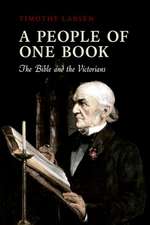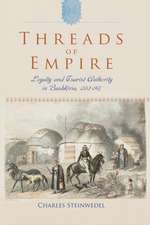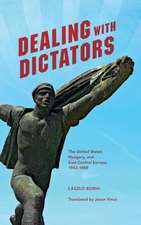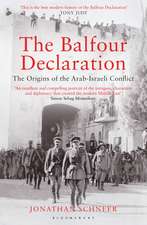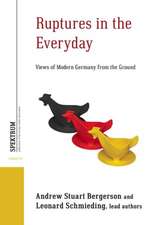Ordinary Germans in Extraordinary Times – The Nazi Revolution in Hildesheim
Autor Andrew Stuart Bergersonen Limba Engleză Hardback – 13 oct 2004
Bergerson details a way of being, believing, and behaving by which "ordinary Germans" imagined their powerlessness and absence of responsibility even as they collaborated in the Nazi revolution. He builds his story on research that includes anecdotes of everyday life collected systematically from newspapers, literature, photography, personal documents, public records, and especially extensive interviews with a representative sample of residents born between 1900 and 1930.
The book considers the actual customs and experiences of friendship and neighborliness in a German town before, during, and after the Third Reich. By analyzing the customs of conviviality in interwar Hildesheim, and the culture of normalcy these customs invoked, Bergerson aims to help us better understand how ordinary Germans transformed "neighbors" into "Jews" or "Aryans."
Preț: 287.12 lei
Nou
Puncte Express: 431
Preț estimativ în valută:
54.94€ • 59.87$ • 46.30£
54.94€ • 59.87$ • 46.30£
Carte tipărită la comandă
Livrare economică 23 aprilie-07 mai
Preluare comenzi: 021 569.72.76
Specificații
ISBN-13: 9780253344656
ISBN-10: 0253344654
Pagini: 336
Ilustrații: 18 b&w illustrations; map
Dimensiuni: 164 x 241 x 25 mm
Greutate: 0.68 kg
Editura: MH – Indiana University Press
Locul publicării:United States
ISBN-10: 0253344654
Pagini: 336
Ilustrații: 18 b&w illustrations; map
Dimensiuni: 164 x 241 x 25 mm
Greutate: 0.68 kg
Editura: MH – Indiana University Press
Locul publicării:United States
Cuprins
Contents
Illustrations
Acknowledgements
Abbreviations
Introduction: New Manners
I: Conviviality in Hildesheim
1. Civility
2. Niveau
3. The Stroll
4. Dirty Politics
II: Making Hildesheim Fascist
5. Coordination
6. Polarization
7. Administration
8. Epistemologies
Conclusion: Dangerous Deeds
Sources
Illustrations
Acknowledgements
Abbreviations
Introduction: New Manners
I: Conviviality in Hildesheim
1. Civility
2. Niveau
3. The Stroll
4. Dirty Politics
II: Making Hildesheim Fascist
5. Coordination
6. Polarization
7. Administration
8. Epistemologies
Conclusion: Dangerous Deeds
Sources
Recenzii
This work intends to serve as both a classic history of the Nazi revolution and a cultural history of everyday life. Focusing on the second of these goals in the narrow context of a single German town means that Bergerson's classic history lacks any serious discussion of Hitler, the Nazi Party, or Germany's politics, economy, or international relations. But if readers accept Hildesheim as remarkably characteristic of interwar Germany, and if 200 hours of taped interviews with 36 representative Hildesheimers provides sufficient evidence, the book has many interesting and provocative things to say about how the town both facilitated and experienced Nazism. Ordinary people's desire for status and power, not just Berlin's dictates, made it possible for German society to go fascist. To make this central point, Bergerson (Univ. of Missouri--Kansas City) skillfully deploys the tools of historical anthropology, minutely dissecting sociability, civility, conviviality, and the many rituals of social intercourse to chart the sometimes subtle, sometimes dramatic, changes in the life of the town. Salutations, human and animal waste, uniforms, strolling, shopping, style of dress, flags, and insignias are mined for meaning. Whether Bergerson's unorthodox methodology succeeds in answering the important questions pertaining to the Third Reich remains an open question. Summing Up: Recommended. Upper--division undergraduates and above.R. S. Levy, University of Illinois at Chicago, 2005jul CHOICE--R. S. Levy, University of Illinois at Chicago, 2005jul CHOICE
Notă biografică
Descriere
The role of ordinary Germans in the success of the Nazi revolution


